Planning worship?
Check out our sister site, ZeteoSearch.org,
for 20+ additional resources related to your search.
- |
User Links
Person Results
Benjamin Cleveland
1733 - 1811 Person Name: B. Cleveland Author of "O could I find from day to day" in The Manual of Praise for Sabbath and Social Worship Cleveland, Benjamin. Probably a Baptist, but known only by his Hymns on Different Spiritual Subjects, in Two Parts, whereof the 4th ed. appeared in Norwich, Connecticut, 1792. He is the author of:—
0 could I find from day to day. [Longing for Christ.] This was preserved from oblivion by the Hartford Selection 1799, and is now in general use as altered and abridged to 4 stanzas by Nettleton, in his Village Hymns, 1824, No. 145. What is supposed to be the original text of the first four stanzas is found in Dr. Hatfield's Church Hymn Book, 1872, No. 876. [Rev. F. M. Bird, M.A.]
--John Julian, Dictionary of Hymnology (1907)
============================
Cleveland, Benjamin. (Windham, Connecticut, August 30, 1733--March 9, 1811, Horton [now Wolfville], Nova Scotia). Baptist. Son of Benjamin Cleveland. The name is sometimes spelled "Cleavland" or "Cleaveland" in family records. He was a layman and a Baptist deacon; little else is known of his life except that of his twelve children, one, Nathan Cleveland, became a Baptist minister. He published in 1792 his Hymns on Different Subjects. In Two Parts in Norwich, Connecticut. His hymn, "O could I find from day to day," was widely reprinted through most of the nineteenth century. In his 1792 collection, it had six stanzas. Joshua Smith reprinted it in 1797, and it was altered for the Hartford Selection of 1799. Asahel Nettleton abridged it to four stanzas and altered it for his Village Hymns in 1824. It was in this form that it was widely sung; it was reprinted in the same for in Edwin Francis Hatfield's Church Hymn Book, 1872. the original first four stanzas treat the desire to "find from day to day a nearness to my God" throughout the course of life, ending in stanza 4 "Thus, till my last expiring breath, Thy goodness I'll adore . . ."
--Thomas W. Hunt, DNAH Archives
Benjamin Cleveland
Abiel A. Livermore
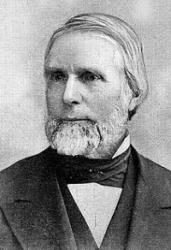
1811 - 1892 Author of "A Holy Air Is Breathing Round" in The Cyber Hymnal Livermore, Abiel Abbot, D.D. was born at Wilton, New Hampshire, Oct. 30, 1811, and graduated at Harvard in Arts, in 1833; and Divinity, 1836. The latter year he was ordained as a Unitarian Minister, and became Pastor at Keene, New Hampshire, 1836; Cincinnati, 1850; Yonkers, New York, 1857. In 1863 he removed to Meadville, Pennsylvania, as the President of the Theological School. Dr. Livermore is the author of various works, and was the chief editor of the Cheshire Pastoral Association's Christian Hymns, 1844, one of the most widely circulated and estimable of American Unitarian collections. To that collection he contributed "A holy air is breathing round" (Holy Communion), which has passed into several collections, including Martineau's Hymns, &c, 1873. [Rev. F. M. Bird, M.A.]
--John Julian, Dictionary of Hymnology (1907), p. 680
Abiel A. Livermore
George Macdonald
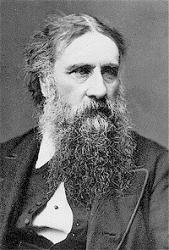
1824 - 1905 Person Name: George MacDonald Author of "Our Father, hear our longing prayer" in The School Hymnary Macdonald, George, LL.D., was born at Huntly, Aberdeenshire, Dec. 10, 1824, and educated at King's College, Aberdeen, where he graduated M.A., and from which he afterwards received the honorary degree of LL.D. For a brief time he studied for the Congregational ministry at Highbury College, London, and then became the Minister of the Congregational Church at Arundel, Sussex (1850-53). He afterwards preached for a short time to a small company at Manchester and Bolton. Relinquishing the ministry, he became Lecturer on English Literature at King's College, London, and ultimately gave himself up entirely to literary work. Dr. Macdonald has acquired a great reputation by means of his works of fiction, most of which were originally contributed to magazines, and the most notable of which are David Elginbrod; Robert Falconer; Alec Forbes of Howglen; and Annals of a Quiet Neighbourhood. He was some time Editor of Good Words for the Young, and wrote England's Antiphon for Macmillan's Sunday Library. His poetical works are:—
(1) Within and Without, 1855; (2) The Disciple, and Other Poems, 1860; (3) The Diary of an Old Soul (printed for private circulation), 1867"; (4) Exotics, a volume of translations from the German (most of which first appeared in the Sunday Magazine), 1876; and (5) A Threefold Cord, 1883, part of which previously appeared in his Works of Fancy and Imagination, 10 vols., 1871.
Most of his original hymns were contributed to Hymns and Sacred Songs for Sunday Schools and Social Worship, &c, published by Fletcher and Tubbs, Manchester, in 1855 (2nd. edition, 1856), and of which his brother, and the Rev. G. B. Bubier were the editors. The original hymns, which are signed "G. Macdonald," in this collection are:—
1. A quiet heart, submissive, meek. The Meek inherit the Earth.
2. Daylight fades away. Second Advent.
3. Father, I well may praise Thy name. Sunday Morning.
4. Father, these souls of ours have been. Blessed are the Pure in Heart.
5. If we were longing for the food. Blessed are they that Hunger and Thirst after Righteousness.
6. It was an awful hour that gave. Blessed are the Merciful.
7. Let Thy own voice, 0 Father, say. Blessed are they that mourn.
8. 0 Son of Man, Thy Name by choice. Blessed are the Meek.
9. Our Father, hear our longing prayer. Blessed are the Poor in Spirit.
Some of these hymns were afterwards revised by their author. The next two are from The Disciple, and Other Poems, 1860 :—
10. O God, Whose daylight leadeth down. Evening.
11. O Lord [God] of life, Thy quickening voice. Morning.
Dr. Macdonald's hymns are rich in ideas, but are touched with a mysticism which renders them a little difficult of apprehension. They are however of great value in setting forth truths rarely expressed in hymns, and are likely to grow in favour. [Rev. W. Garrett Horder]
-- John Julian, Dictionary of Hymnology (1907)
=======================
http://en.wikipedia.org/wiki/George_MacDonald
George Macdonald
Elizabeth Eunice Smith Marcy
1821 - 1911 Person Name: Elizabeth E. Marcy Author of "Out of the Depths to Thee I Cry" in The Cyber Hymnal Marcy, Elizabeth Eunice, wife of Oliver Marcy, LL.D., Professor of Natural History in the Northwestern University, Evanston, Illinois, was born in 1822. Her hymn, "Out of the depths to Thee I cry" (Lent), was contributed to the Methodist Episcopal Hymnal in 1877, and published therein in 1878.
--John Julian, Dictionary of Hymnology, Appendix, Part II (1907)
==================
Born: December 22, 1821, Eastham, Connecticut.
Died: January 26, 1911, Evanston, Illinois.
Buried: Woodland Dell Cemetery, Wilbraham, Massachusetts.
She was active in the Woman’s Christian Temperance Union, the Woman’s Home Missionary Society, and the Woman’s Foreign Missionary Society, and founded the Elizabeth Marcy Home in the Bohemian District of Chicago, Illinois. She was described as a "remarkable woman, full of originality in thought and expression, and known throughout Methodism as a writer in verse and prose, and as a speaker who can make even a prosy theme poetic."
--http://www.hymntime.com/tch
==================
Marcy, Elizabeth Eunice. (Eastham, Connecticut, December 22, 1821--January 26, 1911, Evanston, Illinois). Her hymn in five four-line stanzas was included in the Hymn and Tune Book (1866), Methodist Episcopal Church, South, with the first and third lines of the first stanza interchanged. It appeared again in The Methodist Hymnal, (1905) in its original form.
Source: Nutter and Tillett, Hymns and Hymn Writers of the Church.
--Robert G. McCutchan, DNAH Archives
Elizabeth Eunice Smith Marcy
Wolfgang Christoph Dessler
1660 - 1722 Person Name: Wolfgang C. Dessler Author of "O Friend of souls! how blest the time" in Sacred Hymns and Tunes Dessler, Wolfgang Christoph, son of Nicolaus Dessler, jeweller, at Nürnberg, was born at Nürnberg, Feb. 11, 1660. His father wished him to become a goldsmith, but, as he was not physically suited for this, he was permitted to begin the study of theology at the University of Altdorf. His poverty and bodily weakness forced him to leave before completing his course, and, returning to Nurnberg, he supported himself there as a proof reader. Becoming acquainted with Erasmus Finx or Francisci, then residing in Nürnberg, he was employed by Finx as his amanuensis, and at his request translated many foreign religious works into German. In 1705 he was appointed Conrector of the School of the Holy Ghost at Nürnberg, where he laboured with zeal and acceptance till
1720, when, by a stroke of paralysis, he was forced to resign. Finally, after an illness which lasted about 35 weeks, he died at Nürnberg, March 11,1722. Of his hymns, in all over 100, the best appeared, many with melodies by himself, in his volume of meditations entitled:—
Gottgeheiligter Christen Nützlich Ergetzende Seelenlust unter den Blumen Gottliches Worts, oder andächtige Betrachtungen und Gedanken über unterschiedliche erläuterte Schriftspruche, &c. Nürnberg, 1692 [Berlin] (Koch, iii. 531-535, and iv. 566-567).
From this work (the references to which have been kindly supplied by Dr. Zahn of Altdorf, from his copy), five hymns have been translated into English, viz.:—
Hymns in English common use:—
i. Ich lass dich nicht, du musst mein Jesus bleiben. [Constancy to Christ.] Founded on Genesis xxxii. 36. First published 1692, as above, p. 553, along with Meditation xviii., which is entitled "The striving love." Wetzel (A. H., vol. i., pt. iv., p. 20) says it was sung, at her re¬quest, Sept. 5, 1726, at the deathbed of Christiana Eberhardina, a pious Queen of Poland. In the Berlin Geistliche Liedersegen
Wolfgang Christoph Dessler
Thomas MacKellar

1812 - 1899 Person Name: Thos. MacKellar Author of "Give me to know thy will, O God" in Hymns and Tunes Mackellar, Thomas, was born in New York, Aug. 12, 1812. At the age of 14 he entered the printing establishment of Harper Brothers. In 1833 he removed to Philadelphia and joined the type-foundry firm of Johnson & Smith, as proof reader. He subsequently became a foreman, and then a partner in that firm, which has been known from 1860 as Mackellar, Smiths, and Jordan, type-founders of Philadelphia. His publications include The American Printer, 1866, a prose work, and the following in verse:—
(1) Droppings from the Heart, 1844; (2) Tam's Fortnight Ramble, 1847; (3) Lines for the Gentle and Loving, 1853; (4) Rhymes Atween Times, 1872. The last contains some of his hymns. (5) Hymns and a few Metrical Psalms, Phila. 1883 (71 hymns, 3 psalms), 2nd edition, 1887 (84 hymns, 3 psalms).
Those of his hymns in common use include :—
1. At the door of mercy sighing. Lent. Published in his Rhymes Atween Times, 1872, as, "Long of restful peace forsaken," and again in Dr. Hitchcock's Hymns & Songs of Praise, 1874, as "At the door of mercy sighing."
2. Bear the burden of the present. Resignation. Written in 1852, and published in his Lines for the Gentle and Loving, 1853; and Lyra Sacra Americana, 1868. Part of this hymn, beginning "All unseen the Master walketh," was in common use in Great Britain.
3. Book of grace, and book of glory. Holy Scripture. Written in 1843. It was given in the Sunday School Union Collection, 1860, and his Hymns and a few M. Psalms, &c, 1883, and a few collections, including Allon's Children's Worship, 1878, &c.
4. Draw nigh to the Holy. Jesus, the soul’s Refuge. In Sumner's Songs of Zion, 1851, and the Lyra Sacra Americana, 1868, in 5 st. of 8 1ines.
5. Father, in my life's young morning. A Child's Prayer. Written in 1841.
6. In the vineyard of our Father. Work for God. Written in 1845. It was given in the Hymns for Church & Home, Philadelphia, I860, and other collections.
7. Jesus! when my soul is parting. Continued presence of Jesus desired. Written in 1848, and included in Lyra Sacra Americana, 1868, in 4 stanzas of 6 lines, and entitled "Jesus first and last."
8. There is a land immortal. Heaven. Mr. Mackellar says that this hymn was written
"One evening as a fancy suddenly struck me of a religious nature, I laid aside the work in hand, and pursuing the new idea, I at once produced the hymn, ‘There is a land immortal,' and sent it to the editor [of Neale's Gazette], who referred to it as a religious poem from ‘Tam,' my assumed name, under which I had already acquired considerable notoriety. This was in 1845. It was widely copied, and afterwards inserted in a volume published by me." Duffield's English Hymns, &c, 1886, p. 551.
Mr. Mackellar was an Elder of the Presbyterian Church. [Rev. F. M. Bird, M.A.]
-- John Julian, Dictionary of Hymnology (1907)
======================
Mackellar, T., p. 708, ii. Additional hymns are:— (1) "I have no hiding-place" (Safety in Jesus), (2) “I will extol Thee every day" (Praise to God). These are dated 1880 and 1871 respectively in Stryker's Church Songs, N. Y., 1889. He died Dec. 29, 1899.
--John Julian, Dictionary of Hymnology, Appendix, Part II (1907)
============
Mackellar, T., pp. 708, ii.; 1578, ii. He died Dec. 29, 1899. His hymn, “O the darkness, O the sorrow" (Redemption through Christ), was written in 1886, and added to the latest 1668 editions of his Hymns & Metrical Psalms. It is found in Summa Corda, 1898, and several other collections. His Hymns and Poems were collected and published in 1900. [Rev. L. F. Benson, D.D.]
--John Julian, Dictionary of Hymnology, New Supplement (1907)
Thomas MacKellar
Eliza Scudder
1821 - 1896 Author of "And wherefore should I seek above" in Isles of Shoals Hymn Book and Candle Light Service Scudder, Eliza , niece of Dr. E. H. Sears, (q.v.), was born in Boston, U.S.A., Nov. 14,1821, and now (1888) lives in Salem, Massachusetts. Formerly an Unitarian, she some time ago joined the Protestant Episcopal Church. Her hymns in common use are:—
1. From past regret and present[faithlessness] feebleness . Repentance. In the Quiet Hours, Boston, 1875.
2. I cannot find Thee! Still on restless pinion . Seeking after God. Appeared in Longfellow and Johnson's Unitarian Hymns of the Spirit, 1864.
3. In Thee my powers and treasures live. Faith.
4. Life of our life, and light of all our seeing! Prayer. In the Boston Quiet Hours, 1875.
5. The day is done; the weary day of thought and toil is past. Evening. In Sermons and Songs of the Christian Life, by E. H. Sears, Boston, 2nd ed.,1878, p. 296, entitled "Vesper Hymn," and dated "October, 1874." This is possibly her finest hymn.
6. Thou grace divine, encircling all . Divine Grace. Appeared in Dr. E. H. Sears's Pictures of the Olden Time, as shown in the Fortunes of a Family of Pilgrims, 1857. It was written in 1852, and included in the Boston Hymns of the Spirit, 1864. It has sometimes been taken as "An Ancient Catholic Hymn" (Universalist's Psalms & Hymns 1865), but in error.
7. Thou long disowned, reviled, oppresst. The Spirit of Truth. In the Boston Hymns of the Spirit, 1864.
Of these hymns, Nos. 2, 6, and 7 are in Dr. Martineau's Hymns, 1873. Some of Miss Scudder's poetical pieces appeared in Dr. Sears's Monthly Religious Magazine. Her Hymns and Sonnets, by E. S., were published by Lockwood, Brooks & Co., Boston, 1880. From this her hymn "Thou hast gone up again" (Ascension), is taken. [Rev. F. M. Bird, M.A.]
-- John Julian, Dictionary of Hymnology (1907)
====================
Scudder, Eliza, pp. 1035, L, 1589, i. Miss Scudder died in 1896. Her Hymns & Sonnets, with biographical notes, &c, by Horace E. Scudder, was published by Houghton & Mifflin, 1897. In The Pilgrim Hymnal, 1904, the hymn," Thou Life within my life," begins with st. ii. of "From past regret and present [faithlessness] feebleness," p. 1035, i. 1), which was written in Feb. 1871. Another of Miss Scudder's hymns is “ Let whosoever will enquire" (New Heaven), from which "My God, I rather look to Thee," in Horder's Worship Song, 1905, is taken.
--John Julian, Dictionary of Hymnology, New Supplement (1907)
Eliza Scudder
Caroline A. Mason
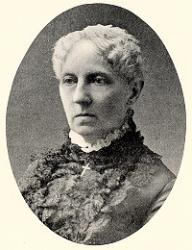
1823 - 1890 Person Name: Mrs. Caroline A. Mason Author of "God Speaks to Me" in The Carol Mason, Caroline Atherton, née Briggs, daughter of Dr. Calvin Briggs, of Marblehead, b. there July 27, 1823, married Charles Mason, a lawyer at Fitchburg, in 1853, and d. there June 13, 1890. She published a volume of poems as Utterance: or Private Voices to the Public Heart, 1852. Her Lost Ring and other Poems was issued in 1891. Of her hymns the following are in common use:—
1. I cannot walk in darkness long. [Evening.] This begins with st. v. of her poem on eventide, "At cool of day with God I walk." In her Lost Ring, 1891, p. 165.
2. 0 God. I thank Thee for each sight. [The Joy of Living.] From her Lost Ring, Dec, 1891, p. 164, where it is entitled "A Matin Hymn," and begins "I lift the sash and gaze abroad."
3. The changing years, eternal God. [Adoration.] Written for the Bicentennial of the First Cong. Church, Marblehead, Aug. 13, 1884 (Lost Ring, 1891, p. 174). It begins "The changing centuries, O God."
Of these Nos. 1 and 2 are in Putnam's Singers & Songs, 1875, pp. 464-5. [Rev. James Mearns, M.A.]
--John Julian, Dictionary of Hymnology, New Supplement (1907)
Caroline A. Mason
Louise M. Armitage
Author of "The Sun Is Setting in Our Lives" in 10 New Hymns on Aging and the Later Years
Louise M. Armitage
Joseph Smith, III
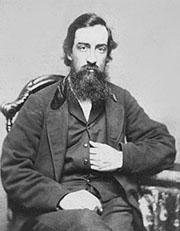
1832 - 1914 Person Name: Joseph Smith III, 1832-1914 Author of "Let, Let Thy Blessing Rest" in Hymns of the Saints
Joseph Smith, III
H. B. Hartzler
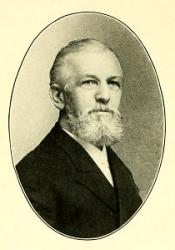
1840 - 1920 Person Name: Rev. H. B. Hartzler Author of "O Holy Ghost, I welcome Thee" in Evangelical Hymnal Hartzler, Henry Burns. (York County, Pennsylvania, March 23, 1840--1920). Evangelical. Licensed 1869, pastor Trinity Church, York Penn., in 1873-1874; editor of The Messenger in 1870s and 1880s; taught Bible in Mt. Hermon school, Northfield, Massachusetts. Was associated with D.L. Moody. Went with the United Evangelical CHurch in the schism, was editor of its Evangel 1894-1902. Editor of and hymn-contributor to Evangelischer Gesangbuch and Hymn Book of the United Evangelical Church. Bishop of that denomination 1902-1910. Most famous hymn was "Go and seek the lost and dying."
--Ellen Jane Lorenz, DNAH Archives
H. B. Hartzler
Karl Gerok
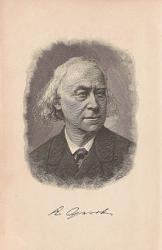
1815 - 1890 Translator of "Vielleicht ist es der letzte Tag" in Lobe den Herrn! Gerok, Karl von, D.D , was born January 30, 1815, at Stuttgart, and studied theology at the University of Tubingen. He was, from 1836 to 1840, assistant at his father's church in Stuttgart; 1840-43, lecturer (repetent) at Tübingen, and after 1844 diaconus at Böblingen, near Stuttgart. In 1849 he returned to preach at Stuttgart, where he now resides (1886), as chief court preacher and oberconsistorialrath (0. Kraus, 1879, p. 165: manuscript from Dr. von Gerok, &c).
Gerok is well known as an eloquent preacher, and has published various volumes of sermons. His fame principally rests on his sacred poetry. The best known of his poetical works is his Palmblätter, 1857, which has attained a wonderful circulation, and reached a 56th edition in 1886. A new series appeared in 1878 as Palmblätter Neue Folge (9th ed., 1885, under the title Auf einsamen Gängen). A series of poems on the Book of the Acts of the Apostles appeared as Pfingstrosen, 1864, (8th ed. 1886). His other poetical works are, Die letzte Strauss, 1885 (5th ed., 1886), Blumen und Sterne, 1867 (11th ed., 1886), and Deutsche Ostern, 1872(6th ed., 1883). The Palmblätter is in four parts: pt. 1 consisting of poems on Holy Words, i.e. mostly founded on sayings of Holy Scripture; pt. ii. on "Holy Times" (Advent, &c); pt. iii. on "Holy Mountains," and pt. iv. on "Holy Waters," i.e. on Mountains and Waters mentioned in Holy Scripture. From it a few centos have passed into some of the recent German hymn-books; and a version apparently including translations of all the poems in the ed. of the German used appeared in English as Palm leaves by Karl Gerok. Translated from the German by J. E. A. Brown. London: Strahan & Co., 1869. A large number of the individual poems have also been tr, by Miss Borthwick (who has also translated a few from the Pfingstrosen), Miss Burlingham, the Revs. Dr. R. Maguire, E, Massie, J. Kelly, and various others. But as none of these versions have passed into English common use, and as the originals are poems and not hymns, we must refer the reader to the works of these translators.
[Rev. James Mearns, M.A.]
-- John Julian, Dictionary of Hymnology
Karl Gerok
Peter Hair Goldsmith
1865 - 1926 Person Name: P. H. Goldsmith Author of "Padre, si tu benignidad" in Himnario provisional con los cánticos Goldsmith, Rev. Peter Hair, D.D. (Greenville, South Carolina, 1865--1926). He was educated at the Southern Baptist Theological Seminary, Louisville, Kentucky, and served several Baptist churches before transferring his membership to the Unitarian denomination, after which he served as minister to the First Church in Salem, Massachusetts, 1903-1910, and to the church in Yonkers, New York, 1910-1917. In 1912, he wrote a hymn beginning "Holy, holy Lord, We with one accord" which was included in The New Hymn and Tune Book, 1914.
--Henry Wilder Foote, DNAH Archives
Peter Hair Goldsmith
Minot J. Savage
1841 - 1918 Person Name: M. J. S. Author of "Father, by whatsoever light" in Sacred Songs For Public Worship Savage, Minot Judson, D.D., was born at Norridgewock, Maine, June 10, 1841, and educated at Bangor Seminary, where he graduated in 1864. From 1867 to 1873 he was a Congregational Minister, and then he joined the Unitarians, and has now (1900) a charge in Boston. He has published several works, including Poems, Boston, 1882. He also edited, with H. M. Dow, Sacred Songs for Public Worship, Boston, 1883, to which he contributed 46 original hymns. In hymnals other than this, of his hymns the following are in common use:—
1. Dost thou hear the bugle sounding. Consecration to Duty.
2. Father, we would not dare to change Thy purpose, &C. Prayer.
3. 0 God Whose law is in the sky. Consecration to Duty.
4. 0 star of truth down shining. Truth.
5. The God that to the fathers revealed His holy will. God unchangeable.
6. The very blossoms of our life. Holy Baptism.
7. What purpose burns within our hearts. Joining in Church Fellowship.
8. God of the glorious summer hours. New Year This is in D. Agate's Sunday S. Hymn Book, 1881, No. 371, and dated 1875. From the Sunny Side, N.Y.. 1875,p. 119.
Some of these hymns are given in Hunter's Hymns of Faith and Life, Glasgow, 1889, and recent American hymnals.
--John Julian, Dictionary of Hymnology, New Supplement (1907)
Minot J. Savage


 My Starred Hymns
My Starred Hymns


